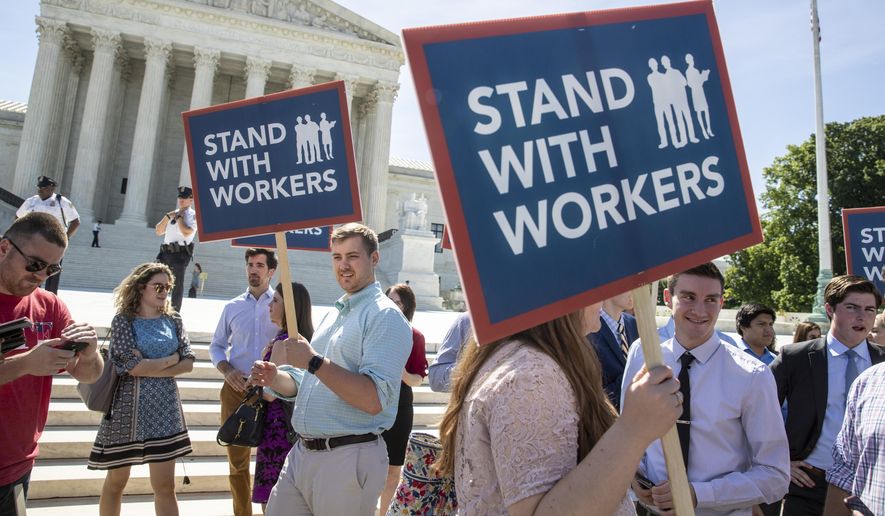Lawyers across the country are challenging the dues they pay to their state bar associations, saying they’re being forced to subsidize organizations that they fundamentally disagree with politically.
Lawyers from North Dakota to Texas to Oregon are banking on last year’s Supreme Court ruling that said public-sector employees don’t have to pay dues to labor unions they believe take political stands they don’t like.
Thirty-one states require active lawyers to pay bar fees.
Arnold Fleck says his bar association in North Dakota spent $50,000 to oppose a state ballot measure on child custody cases. Mr. Fleck says he supported the measure and doesn’t see why part of his roughly $350 annual dues was used to advocate for an issue he disagreed with.
In Texas, three lawyers filed a lawsuit last month challenging their own dues, saying State Bar of Texas President Joe Longley has been actively fighting President Trump’s immigration agenda, while cloaking it in complaints about access to the legal system for migrants.
Mark Pulliam, one of the Texas lawyers, says that in light of the Supreme Court’s ruling, it’s problematic for any organization to require mandatory dues while engaging in politics.
“The only reason this hasn’t been challenged before is because more often than not is that in doing so you are going to antagonize people — some very important people — because you are a dissenter, a litigant,” he told The Washington Times. “Younger attorneys, those just starting out in their careers, don’t want to do that.”
The lawyers are banking on courts being willing to expand last year’s ruling in the Janus v. American Federation of State, County and Municipal Employees case, in which Illinois state employee Mark Janus challenged the mandatory dues he had to pay to the labor union, which argued for positions such as class size that he disagreed with.
In a 5-4 ruling in June, the high court overturned a 1970s-era precedent and sided with Mr. Janus, saying his First Amendment speech rights were being trampled by forcing him to subsidize speech he didn’t like.
That set off a chain reaction of litigation.
Some public-sector employees have asked unions to return the dues they have paid.
Other lawsuits seek to expand the First Amendment principles of the Janus ruling into other areas, such as the compulsory bar fees.
Mr. Fleck’s case in North Dakota is the most advanced.
He lost at the district and circuit court levels, but the Supreme Court sent the case back down for more argument after its Janus ruling.
“Just as the government cannot force its employees to pay union fees to attain its interest in ’labor peace’ … so it cannot force lawyers to join and pay dues to a bar association to serve its interest in regulating the legal profession,” Mr. Fleck’s attorneys said in court documents.
The State Bar Association of North Dakota, though, said states must regulate the legal profession and that the Janus ruling in 2018 is applicable only to union dues.
The state bar relies on a 1990 Supreme Court ruling that said an arrangement requiring lawyers to join and pay into a state bar association is legal as long as the bar is not lobbying or engaging in politics.
Legal analysts say the lawyers’ First Amendment claims have merit but that the state interest in regulating the legal profession, such as ethics rules and attorney sanctions, appears to have more weight.
“States historically regulate lawyers just like doctors and nurses. When a state regulates a profession, that implicates their police powers and it has significant interests when it operates in this manner,” said Mitchell Rubinstein, a professor at New York Law School.
Trey Apffel, executive director of the State Bar of Texas, told The Times it will “vigorously defend itself” by arguing that the fee collection is legal under Supreme Court precedent.
“The State Bar of Texas protects the public, serves its members and supports the administration of the legal system,” Mr. Apffel said.
“It is disappointing that the plaintiffs have specifically targeted the state bar’s access to justice and diversity programs,” he added, noting that the initiatives “help ensure that this state’s community of lawyers can appropriately serve Texas’ growing and diverse population.”
The bar association’s in-house publication and the Lone Star State’s legal press have depicted the plaintiffs as reactionaries who oppose legal counsel for minorities and illegal immigrants.
That’s a warped view, Mr. Pulliam said.
“This is the legal establishment’s way of circling the wagons,” he said. “There is a legitimate and long-standing objection to compelled speech. It’s the fact you are being compelled to support it that is the problem.”
Yet another case is playing out in Oregon, where a federal magistrate judge found against lawyers challenging their bar fees.
Magistrate Judge Jolie A. Russo, in a 27-page opinion, also relied on the 1990 case from the Supreme Court.
“To the extent the bar has proper procedural safeguards in place to ensure members are not required to fund non-germane speech, the First Amendment is not violated,” the judge said.
She submitted her opinion to a district judge.
Michael Spencer, a lawyer handling the challenge to the Oregon bar, said they expected the ruling and figure the district judge will agree with the magistrate judge.
“We expected this result at the district court level and are planning an appeal to the 9th Circuit,” Mr. Spencer said.
⦁ Editor’s note: Alex Swoyer is a licensed attorney in Texas.
• Alex Swoyer can be reached at aswoyer@washingtontimes.com.
• James Varney can be reached at jvarney@washingtontimes.com.




Please read our comment policy before commenting.